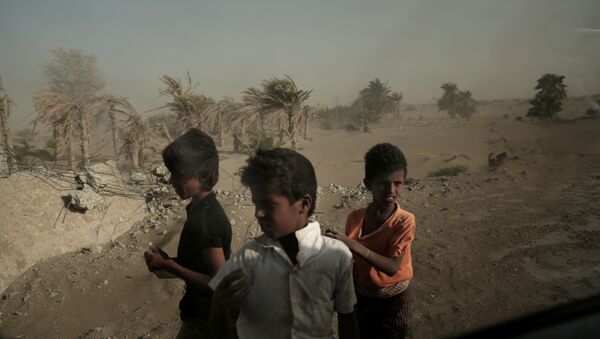It's estimated 7,000 African migrants are arriving in Yemen each month; leaving home on foot and walking through Djibouti before catching a boat across the Gulf of Aden where they head north to the border with Saudi Arabia.
"They are just a commodity to smugglers," Mohammed Abdiker, director of operations and emergencies at the International Organization for Migration (IOM) said in a statement.
"Something to make quick and easy money from and, if they die, the smugglers do not care as there are thousands of other people willing to pay for their services and risk their lives to simply build their parents a house, put their brother through school, or for any opportunity at all," Abdiker added.
In Yemen, I met teenagers in utter distress from what they had experienced already in their young lives. They are just a commodity to smugglers – something to make quick and easy money from and, if they die, the smugglers don't care.
— Mohammed Abdiker (@AbdikerM) May 8, 2018
According to the IOM, migrants risk being exploited by smugglers, often physically and sexually abused, tortured or made to work for nothing.
They have nothing but the hope of opportunity far from their rural homes and can only afford and access a deadly migration route through a conflict-zone. — read my full statement on the situation of migrants in Yemen: https://t.co/adO6ao40XZ
— Mohammed Abdiker (@AbdikerM) May 8, 2018
#Yemen-i authorities have deported people en masse — including refugees and asylum seekers — out to sea in dangerous conditions.
— Kristine Beckerle (@K_Beckerle) April 18, 2018
This year, dozens of Somalis died this way.
Those who deported them — using smugglers — are responsible for these deaths.
In August 2017, Ethiopian and Somali teenagers were forced into the sea by smugglers off the coast of Yemen and drowned.
Breaking: 180+ migrants forced from boat today, a day after 50 Somalis & Ethiopians were drowned by smugglers off #Yemen. pic.twitter.com/piuSSNDgDu
— IOM — UN Migration (@UNmigration) August 10, 2017
Cholera is spreading across the country, blamed on the civil war which still rages, by October 2017, it was predicted that 800,000 people were affected by the disease.
Children during the Oral #Cholera Vaccination Campaign are proud to show their vaccination cards. We are working to ensure the children of #Yemen are protected against the cholera outbreak, the largest and fastest-spreading outbreak of the disease in modern history. pic.twitter.com/lYMIkxzQgO
— WHO Yemen (@WHOYemen) May 9, 2018
"Yemen is experiencing the worst humanitarian crisis in the world; it is obviously not a safe route for migrants, nor is it safe for Yemenis themselves in many areas," Mr. Abdiker said.
Yemen is experiencing the worst humanitarian crisis in the world; it is obviously not a safe route for migrants, nor is it safe for Yemenis themselves in many areas
— Mohammed Abdiker (@AbdikerM) May 8, 2018
READ MORE: UK Accused of Secretly Delivering Arms to Middle East — Reports
Yemen's civil war deepened in 2015 when a Saudi-led coalition intensified military operations against Houthi rebels who control the capital Sana'a, the United Nations stated.
It's the most crowded street in #Sanaa the capital of #Yemen, it was during rush hour, #Saudi fighter jets bombed civilans and left tens of civilans between killed and wounded violating all international humanitarian laws!! pic.twitter.com/Kvk0mjpbSL
— Maha Nagi (@MahaNagi) May 7, 2018
"The Secretary-General reminds all parties to the conflict that they must uphold international humanitarian law, including taking steps to protect civilians," said a statement issued on behalf of the Secretary General, by his Spokesperson Stephane Dujarric.
#Yemen has been one of the most disproportionately under-reported humanitarian emergencies in Western media, despite the #UN calling it the world's worst man-made crisis. Yet because the suffering is so overwhelming, it is now impossible to hide what is going on there.
— Jon Fenton-Harvey (@jfentonharvey) May 8, 2018
READ MORE: UK Activists Win Appeal Against Arms Sales to Saudi Arabia Amid Yemen War
According to the Campaign Against Arms Trade (CAAT) the Saudi-led coalition has been using British supplied fighter planes since the beginning of its military operation against Houthi rebels in Yemen in 2015.
Britain must #StopArmingSauid!
— Sam Walton (@SamWalton) May 10, 2018
Art by Yemeni artist @A7medJa7af. pic.twitter.com/y93HSCzWpi
If migrants don't fall prey to the criminal gangs and people smugglers, they find themselves in the midst of a humanitarian crisis, a cholera epidemic and conflict zone.
In #Yemen people are struggling to find safety and shelter… pic.twitter.com/2bnuw3lXbY
— Nino Fezza (@nfcinereporter) May 10, 2018


